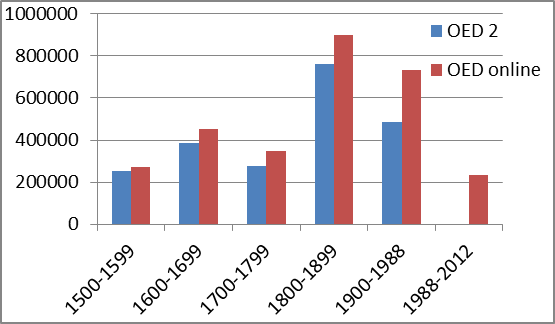The Oxford English Dictionary is widely regarded as the most important dictionary of the English language and therefore, considered to be one of the most significant dictionaries worldwide. It is not a classical linguistic corpus to work with, but as the name suggests, a historical dictionary. Currently, three different versions of the OED are accessible for the researcher: the traditional OED print version, the OED2, which includes a CD-Rom of the second edition, and the most current online version of the OED.
In chapter 7 Rohdenburg bases his linguistic research completely on the CD-Rom version which is an unchanging and stable collection of data. Unfortunately, this stability can only be maintained if all further corrections, modifications or additions of words within the OED are neglected. In contrast, the OED online - updated every three months - is a constantly changing and advancing source. These updates aim to optimize the online version in two ways: by improving already existing data and by extending vocabulary or relevant quotations even further.
In sections 2.6 and 2.7, Rohdenburg criticizes, inter alia, that some headword sections occasionally fall short of providing a precise and correct development of a certain word and that given quotations may sometimes appear with conflicting dates or partially different text portions. Reapplying the examples he gives, one finds that that some of these presumably randomly picked erroneous quotations have already been corrected in the current version. For example, the OED online does no longer claim that the “transitive” use of accommodate has become obsolete and the sentence “Though the mills of god grind slowly, yet grind exceeding small”, which was listed with the conflicting dates 1846 and 1870 before, appears in the current version only once. These corrections are proof of the intensive efforts to optimize the OED.
As a matter of fact, all these corrections and modifications influence the outcome of linguistic studies to a more or less significant degree. The exact number of quotations for any time period can easily be looked up by choosing the advanced search for quotations and restricting the search only to a certain time span and leaving the other boxes blank. Doing so, a specific number of entries appears on top of the page.
Comparing the incorporated number of quotations with Rohdenburg’s results mentioned in table 3 of his chapter in the two different versions of the OED, the impact of these modifications is obvious.
Years |
OED 2 |
OED online |
1500-1599 |
250,891 |
273,840 |
1600-1699 |
386,228 |
451,139 |
1700-1799 |
274,645 |
347,731 |
1800-1899 |
762,417 |
898,794 |
1900-1988 |
487,370 |
734,494 |
1988-2012 |
0 |
235,333 |
Table 1 Number of quotations in the OED for the centuries between 1500 and 2012 (August 2012).
The following graph based on the results in table 1 illustrates, that the number of quotations has increased in all time periods investigated. This is especially true for the 19th and 20th centuries. In this subperiod, both editions show the highest number of quotations and this is also the time span in which the OED online authors added the most important number of new quotations. In addition, the relatively small period from 1988-2012 is represented by 235,333 quotations in the online version. That is a relatively high number for only 24 years and covers about 10.67% of the total OED quotations. These newly added quotations might document recent developments in language variation and change, which could not be traced by Rohdenburg before.
 * OED online: accessed 17.06.2012
* OED online: accessed 17.06.2012
Graph 1 Number of quotations for the centuries between 1500 and 2012 (August 2012).
As indicated, the constantly increasing number of quotations combined with advanced search features offers new possibilities and limitations for the researcher. This webpage will highlight new useful features of the current OED online version for linguists and demonstrates how to apply these features. Some of Rohdenburg’s queries from chapter 7 and some completely new ones are applied in the following.
Created with the Personal Edition of HelpNDoc: Produce Kindle eBooks easily